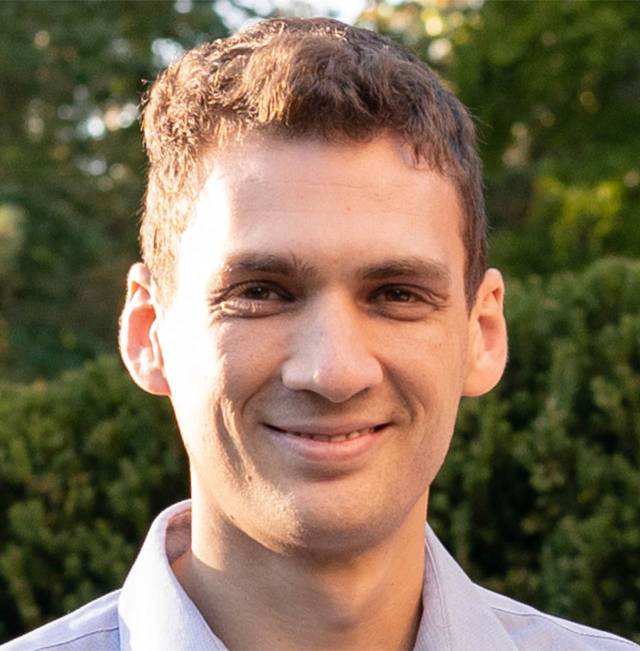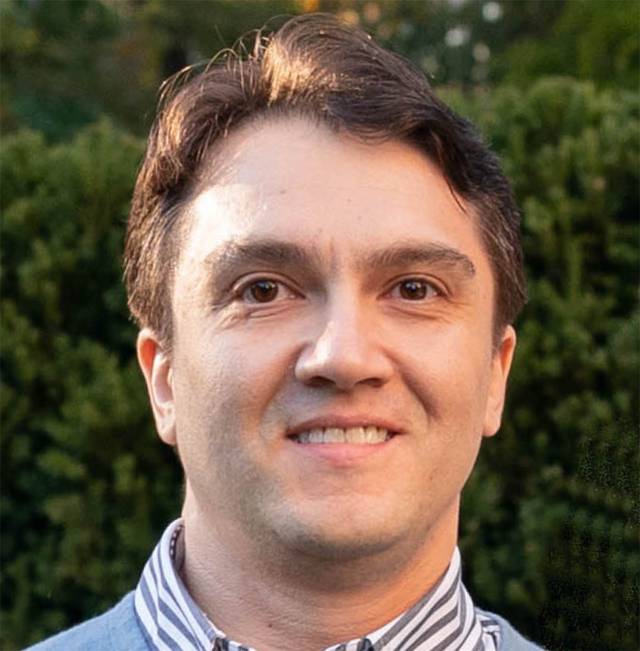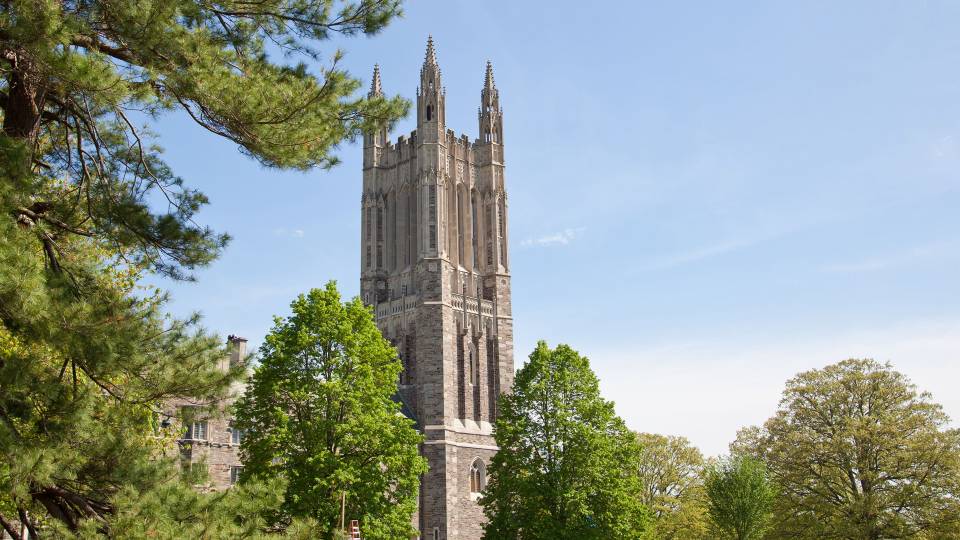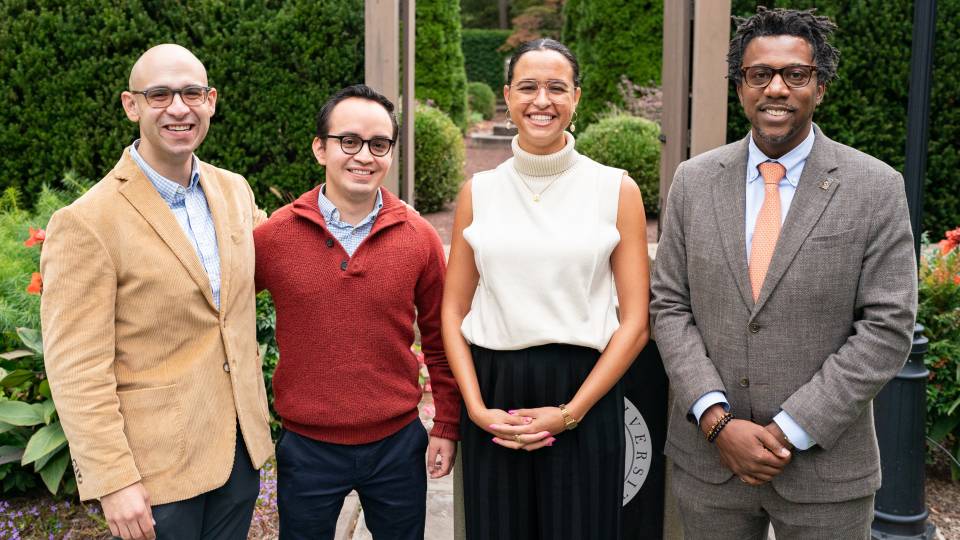Binyamin "Benny" Kleinman, Jason Molesky, Mira Nencheva and Lila Rodgers have been named winners of the Porter Ogden Jacobus Fellowship, Princeton University’s top honor for graduate students.
The Jacobus Fellows will be honored at Alumni Day ceremonies Saturday, Feb. 25.
The fellowships support the students’ final year of study at Princeton and are awarded to one Ph.D. student in each of the four divisions — humanities, social sciences, natural sciences and engineering — whose work has exhibited the highest scholarly excellence. The fellows all plan to pursue academic careers.
Benny Kleinman

Binyamin Kleinman
Kleinman, a doctoral student in economics who came to Princeton in 2017, earned his bachelor’s degree in economics and Middle Eastern studies at the University of Haifa and a master’s degree in economics from Tel Aviv University.
His dissertation, “Wage Inequality and the Spatial Expansion of Firms,” investigates the geographical expansion of large firms in services sectors and its effects on labor markets, most notably on the rise of wage inequality in the U.S. in recent decades.
“My research speaks jointly to multiple trends that for the most part have been studied in separate literatures,” said Kleinman. “It offers a theory that helps us to understand why wage inequality has been growing in recent decades both across different firms and within them, and how it relates to the increase in spatial disparities.”
His research also identifies uneven patterns in firms’ demand for workers across space. As multi-region firms become larger, they increase demand for low-skilled labor across multiple local markets, while their demand for skilled workers increases mostly in their geographically concentrated headquarters, located in cities such as New York or San Francisco. As a result, the economy becomes increasingly segregated.
“Benny’s research helps us understand that process of polarization, why we see that emergence of skill clusters in cities, and why we see other locations lose skilled workers,” said Stephen Redding, the Harold T. Shapiro '64 Professor in Economics and professor of economics and international affairs, Princeton School of Public and International Affairs. “This is central to understanding the potential public policy implications of this growing wage inequality.”
At Princeton, Kleinman has served as both a research assistant and a teaching assistant. He is the recipient of Princeton’s Prize Fellowship in the Social Sciences and the Avinash K. Dixit Prize, International Economics Section, and was also awarded the Best Job Market Paper by the European Economic Association and UniCredit Foundation.
“Benny's approach helps us understand growing wage inequality across space within the U.S. and why skilled workers have increasingly concentrated in a few cities,” Redding said.
Jason Molesky
Molesky, a doctoral student in English who came to Princeton in 2016, earned his bachelor’s degree in English from the University of Florida and an M.F.A. in fiction from the University of Mississippi.

Jason Molesky
His dissertation, “Company Town Archipelago: Culture, Environment, and American Corporate Empire,” examines the art and other creative works that emerge out of four different sites of extraction in the U.S. — for coal, natural gas, uranium and steel — and the ways in which creative works expose the often-unseen devastation experienced in company towns.
Molesky, who grew up in Central Appalachia and whose family has worked in extractive industries for generations, says that his personal experiences helped shape his research interests — and his desire to make a difference in these communities.
“A lot of the traditions of art and activism that come out of company towns provide a very rich archive of materials that, if drawn upon today, can move towards a world in which working class people are treated with more dignity and have opportunities for better environmental health,” said Molesky.
“Jason is working with literature, photography, film and theater and he's assembling these materials in new ways, writing about them with the eye and perspective of a creative writer, as well as a critical thinker,” said Bill Gleason, the Hughes-Rogers Professor of English and American Studies. “Part of Jason’s mission in doing this work is not simply to present a scholarly analysis of it, but to provide new ways of understanding experiences that many people are having in company towns all over the country.”
He added: “He is always thinking about how he can make the material meaningful not only to academic readers, but to people who live in the communities affected by this kind of work.”
Molesky has served as a teaching assistant and as a co-instructor in the Princeton Prison Teaching Initiative. He is also a representative of the English Graduate Working Group.
After graduating, Molesky will join the faculty at Saint Louis University as a tenure-track assistant professor in the English department.
Mira Nencheva

Mira Nencheva
Nencheva, a fifth-year doctoral student in psychology who came to Princeton in 2018, earned her bachelor’s degree in symbolic systems from Stanford University and a master’s degree in psychological and brain sciences from Dartmouth College.
Her dissertation, “The dynamics of emotion and speech in early caregiver-child interactions,” focuses on the intertwined nature of emotion and speech in children’s first learning experiences.
Nencheva uses computational tools to investigate the dynamics of information that parents and children exchange during natural interactions, with the goal of understanding of how early communication shapes the development of emotion and language in tandem. “Kids receive information about so many different things when they are interacting with their caregivers,” she said. “They hear words they might not have heard before; they see their caregiver smile or use a particular intonation. Children have to track all this information as it’s changing from one moment to the next.” She has published three papers in major journals, and she has three more in review.
In over a dozen unique projects that Nencheva has tackled at Princeton, she has studied social communication from every angle, including projects on the acoustics of caregiver speech, the dynamics of visual emotion expressions, the linguistic context surrounding emotion words, and interactions between the emotion dynamics of caregivers and children over multiple days. She has analyzed raw audio signals, emotional experience samples, pupillary responses to both spoken and visual stimuli, multi-day and multimodal recordings of children in their homes, and neural activity during communication.
“Mira is a scientific force, both theoretically and methodologically,” said her adviser Casey Lew-Williams, a professor of psychology and the director of the Princeton Baby Lab. “She can harness big data about children’s communicative environments; she's bilingual in research fields that don't really speak to each other; and she can reason carefully about the complexities of early development.”
He added, “She serves as a role model for scientists of truly any career stage. When people present a problem to Mira, original ideas happen.”
Nencheva’s previous awards include the Developmental Science Early Career Researcher Prize; the Princeton Graduate School Teaching Award; the Cognitive Science Graduate Student Fellowship; the Azure Cloud Computing mini-grant from the Princeton Center for Statistics and Machine Learning; and the Walter McKinney ‘50 Life Sciences Fellowship.
Nencheva has served as a teaching assistant for “Life Cycles of Behavior,” “Social Psychology” and “Developmental Psychology.” She has supported new teaching assistants as a McGraw Teaching Fellow, mentored 10 undergraduates in the department and served as a mentor for Princeton's ReMatch over the past two summers. She has also served as the Health & Life Officer for Princeton's Graduate Student Government. In this role, she leads the graduate mental health initiative on campus, organizing more than 100 workshops to support graduate student wellbeing.
Lila Rodgers
Rodgers, a sixth-year doctoral student in computer engineering who came to Princeton in 2017, earned her bachelor’s degree in electrical engineering from Brown University in 2016.

Lila Rodgers
Her dissertation, “Engineering highly coherent qubits by correlating surface spectroscopy with quantum measurements” tackled engineering challenges in two different quantum systems: nitrogen-vacancy centers in diamonds and superconducting qubits. Her work has contributed directly to two very different technologies: quantum computers and quantum sensors.
“Quantum systems promise significant technological advances, but they suffer from significant engineering challenges that prevent us from realizing their full potential,” she said. “My research has focused on improving quantum technologies by correlating materials spectroscopy with quantum measurement.”
Rodgers made several key breakthroughs, leading to three patent applications and multiple first-author papers in major journals, including Nature Communications. Among other projects, she worked to build the world’s first ever confocal microscope inside a cryogenic high vacuum chamber and helped make the first significant breakthrough in superconducting qubit coherence in a decade.
Quantum information is extremely fragile and error prone, lasting for a very short window called the “coherence time.” Since 2012, despite enormous investment in superconducting qubits, no one had been able to lengthen coherence time beyond about 100 microseconds. In collaboration with Andrew Houck and Robert Cava and their research teams, Rodgers was able to triple that to 300 microseconds.
“This has changed the shape of our field,” said Houck, a professor of electrical and computer engineering. “Many groups around the world have adopted our process, and others have adopted our research methodology.”
“Lila is an excellent experimentalist and a research powerhouse,” said Nathalie de Leon, Rodgers’ adviser and an associate professor of electrical and computer engineering. “She is fearless in tackling the big, important problems, and she is a broad enough thinker to strategically find these big problems independently.
“She has the instinct to fail quickly and keep up a high attempt rate,” de Leon said. “Lila is especially talented at finding new breakthroughs in interdisciplinary problems, a testament to her ability to be nimble and quick on her feet. She is also a wonderful colleague, whose work has exhibited the highest scholarly excellence. Many of our group members rely on her for technical advice, troubleshooting and brainstorming.”
Rodgers served as a teaching assistant for "Quantum Materials Spectroscopy," for which she earned the 2021 Teaching Assistant Award. Her other awards include the 2021 School of Engineering and Applied Science Award for Excellence, a 2021 De Beers Diamond Conference Poster Presentation Award, and a 2018 National Defense Science and Engineering Graduate Fellowship.






